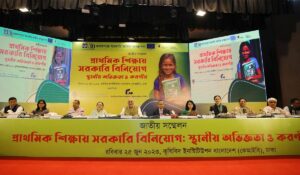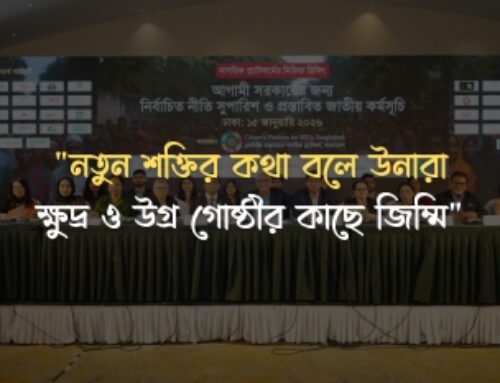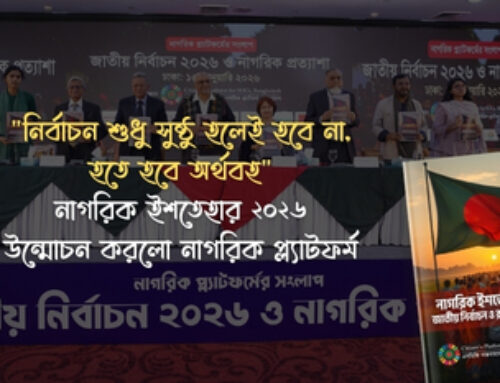
It is crucial to address the need to increase the number of teachers in each school and provide subject-specific training to them. In many schools, especially at the primary level, the scarcity of teachers poses a significant challenge, as it hinders the ability to conduct classes when a teacher is transferred, absent, or no substitute is available. The student-teacher ratio remains high due to a shortage of teachers. The urgency to introduce midday meal programmes has grown significantly, as they play a crucial role in reducing the dropout rate among students coming from disadvantaged groups. Special attention should be given to transportation in char areas, as it is a significant barrier preventing regular attendance of children in schools. Yet, the budget allocation for the Ministry of Primary and Mass Education decreased from 6.51 per cent of the total budget in FY2016-17 to 4.56 per cent in FY 2023-24. The percentage of total government expenditure decreased from 6.38 per cent in 2016-17 to 4.53 per cent in 2021-22.
These observations emerged at the national conference titled ‘Investing in Public Primary Education: Local Concerns and Expected Actions’ on Sunday, 25 June 2023, at Dhaka, organised by the Centre for Policy Dialogue (CPD), with support from the European Union (EU), in partnership with Eco-Social Development Organization (ESDO) and in collaboration with Citizen’s Platform for SDGs, Bangladesh. The conference was based on a social audit and subnational dialogues conducted in the three upazilas on the quality of primary education held in the Sundarganj upazila in Gaibandha district, Dimla in Nilphamari district and Sadar upazila in Thakurgaon district.
The conference was moderated by Dr Debapriya Bhattacharya, Convenor, Citizen’s Platform and Distinguished Fellow, CPD. He said that it is necessary to create awareness among people about the national development activities such as the improvement of the primary education system. At the same time, there is a need to increase citizen involvement in development activities to ensure transparency, accountability and public access.
‘Nowadays the teaching profession is not held in high regard, lacking the dignity that it deserves’ said Dr Fahmida Khatun, Executive Director of CPD, while making her introductory remarks. She highlighted that unless the social status of teachers is elevated through salary increments and additional benefits comparable to other professions, individuals may not opt for this career path.
In his introductory remarks Dr Md. Shahid Uz Zaman, Founder & Executive Director, Eco-Social Development Organization (ESDO) said ‘In Char areas, a significant number of primary teachers display reluctance to conduct regular classes, resulting in substitute teachers having to act as proxies.’ He opined that such problems can be solved without the need for a huge investment; a shift in the mindset of the teachers is required to solve such issues.
In his keynote presentation, Mr Towfiqul Islam Khan, Senior Research Fellow, CPD, recommended ‘Every school must systematically construct the necessary number of classrooms, considering the student population, and ensure that they are equipped with appropriate facilities’. He suggested that every school needs to ensure quality education by appointing specialised teachers and imparting subject-specific training to teachers.
He highlighted that there is a need to appoint dedicated and trained teachers for extra-curricular and co-curricular activities and to increase the range of cultural activities in co-curricular activities. Provision and regular use of digital learning materials need to be ensured to improve the quality of primary education. Every school needs to provide the required number of separate toilets for male and female students periodically and ensure standard sanitation. Libraries and common rooms should be gradually established as separate rooms in every school, with the possibility of collecting books or donations locally if necessary.
‘To ensure the enrollment of marginalised children in schools, a comprehensive approach is necessary, which involves addressing ways to improve their economic conditions and improving transportation to schools’ said the Chief Guest Mr Md. Tazul Islam, MP, Hon’ble Minister, Ministry of Local Government, Rural Development & Co-operatives, Government of Bangladesh.
Ms Shirin Akhter, MP, Member, Parliamentary Standing Committee on Ministry of Primary and Mass Education said ‘In addition to imparting subject-specific knowledge, it is equally crucial to support children in developing their personalities and fostering mental growth, which can only be achieved if their teachers are trained in these areas’.
Commenting on the budget allocation for primary education, Mr Samir Ranjan Nath, Programme Head ,BRAC–Institute of Educational Development (IED) said ‘The quality of education will not improve, regardless of the extent of fund allocation, if teachers are not appropriately trained’. He also said that initiatives should be taken to help students recover from the learning loss that occurred during the pandemic.
‘The education of the marginalised children was adversely affected during the time of COVID-19 pandemic’ said Ms Nadia Rashid, Programme Manager, Education and Human Development Team, Delegation of the European Union to Bangladesh. She emphasised that the impact of the pandemic on education varied across different areas, highlighting the need for tailored assistance specific to each location.
Mr Syed Rashed Al Zayed Josh, Senior Economist, Education Global Practice, The World Bank, Bangladesh, said ‘For effective citizen engagement in matters such as improving primary education, there is a need for a platform that facilitates two-way communication, provides essential information, enables data collection, and encourages feedback. However, the systematic adherence to these criteria is currently lacking.’
Ms Jurate Smalskyte Merville, Counsellor, Team Leader – Education, Human Development & Public Finance Management, Delegation of the European Union to Bangladesh said that there is a need to increase budget allocations for primary education and ensure the effective implementation of budgetary plans for this sector.
In the open floor discussion, the participants emphasised the need for investments required for improving the economic conditions of ultra-poor families, ensuring that they do not hesitate to send their children to school due to financial constraints. They recommended that initiatives should be taken to reduce sexual harassment of children at schools. Targeted investments should be directed towards providing necessary facilities for disabled children so that they can attend classes effectively.
Professor Mustafizur Rahman, Distinguished Speaker, CPD and Core Group Member, Citizen’s Platform, in his concluding remarks, said ‘Spending on education is not merely an expense; rather, it is an investment that can yield manifold returns when adequately prioritised.’
More than 350 attendees, including 150 from the local level, actively participated in the conference.





Leave A Comment